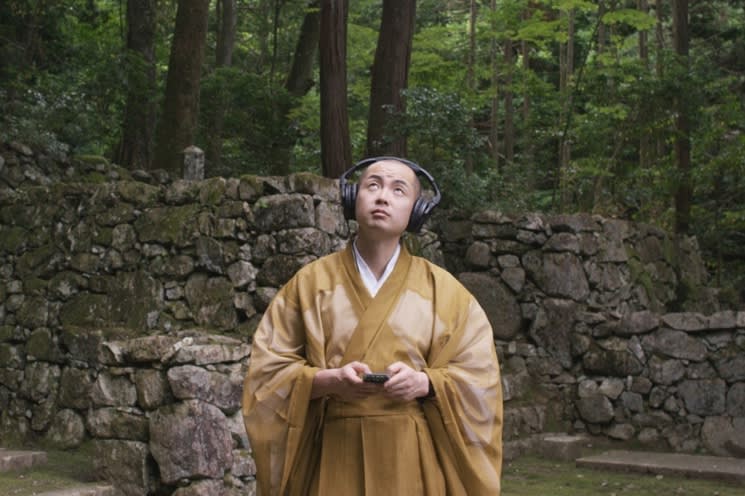Crows Are White examines the ascetic lives of Buddhist monks living on a mountain near Kyoto, Japan — but rather than the deferential tone viewers might expect from such subject matter, Crows Are White resembles nothing so much as the quirky irreverence of John Wilson. Director Ahsen Nadeem deadpans his way through quirky reflections on the monks' way of life, his observations punctuated by self-deprecating cracks and a lighthearted score.
What begins are a straightforward documentary about monks quickly goes sideways, as Nadeem's cellphone rings while he's filming a sacred ritual and he's barred from the monastery. Without access to his primary subjects, he does the next best thing: visits the gift shop at the bottom of the mountain, where he meets Ryushin, the lowest ranking monk on the mountain.
Ryushin is perhaps the least monk-like monk imaginable: he loves heavy metal, has a sweet tooth, eats meat, drinks alcohol and dreams of living a happy life as a sheep farmer in New Zealand. While the other monks speak solemnly about the feats of strength they perform in order to achieve enlightenment, Ryushin quickly dispels the façade. During his training, when he was supposed to go 90 days without sleep, he admits that he slept eight hours a night — because he's a human being, so of course he did. "I was so sleepy," he says between mouthfuls of chocolate cake.
In Ryushin, Nadeem finds qualities missing from his other interactions at the monastery, like compassion, humour, and a willingness to admit doubts and weakness. Through their blossoming friendship, Nadeem begins examining the film's true subject: himself. Nadeem comes from a strict Muslim household, but he has strayed from his religion in adulthood and is engaged to a non-Muslim woman, Dawn Light Blackman (who is credited as a co-writer on Crows Are White). This is, ultimately, the film's central conflict: coming to terms with the pious perfection demanded by his religious family with also being true to himself and his fiancée.
Crows Are White can be a slightly uncomfortable watch — at first because of how Nadeem brings his camera into places where the monks don't want him, and later because of how he brings a camera crew to document intensely private family moments. The film's invasive qualities are openly acknowledged, providing some meta commentary on the nature of documentary filmmaking itself — which links back nicely to the theme of Nadeem following his heart in spite of his parents' wishes.
It's an occasionally heartbreaking but ultimately inspiring account of embracing one's true self. It's truly beautiful to see Nadeem and Ryushin fail to match the perfection that's demanded of them, and instead bond over their shared human weakness.
(Memory)What begins are a straightforward documentary about monks quickly goes sideways, as Nadeem's cellphone rings while he's filming a sacred ritual and he's barred from the monastery. Without access to his primary subjects, he does the next best thing: visits the gift shop at the bottom of the mountain, where he meets Ryushin, the lowest ranking monk on the mountain.
Ryushin is perhaps the least monk-like monk imaginable: he loves heavy metal, has a sweet tooth, eats meat, drinks alcohol and dreams of living a happy life as a sheep farmer in New Zealand. While the other monks speak solemnly about the feats of strength they perform in order to achieve enlightenment, Ryushin quickly dispels the façade. During his training, when he was supposed to go 90 days without sleep, he admits that he slept eight hours a night — because he's a human being, so of course he did. "I was so sleepy," he says between mouthfuls of chocolate cake.
In Ryushin, Nadeem finds qualities missing from his other interactions at the monastery, like compassion, humour, and a willingness to admit doubts and weakness. Through their blossoming friendship, Nadeem begins examining the film's true subject: himself. Nadeem comes from a strict Muslim household, but he has strayed from his religion in adulthood and is engaged to a non-Muslim woman, Dawn Light Blackman (who is credited as a co-writer on Crows Are White). This is, ultimately, the film's central conflict: coming to terms with the pious perfection demanded by his religious family with also being true to himself and his fiancée.
Crows Are White can be a slightly uncomfortable watch — at first because of how Nadeem brings his camera into places where the monks don't want him, and later because of how he brings a camera crew to document intensely private family moments. The film's invasive qualities are openly acknowledged, providing some meta commentary on the nature of documentary filmmaking itself — which links back nicely to the theme of Nadeem following his heart in spite of his parents' wishes.
It's an occasionally heartbreaking but ultimately inspiring account of embracing one's true self. It's truly beautiful to see Nadeem and Ryushin fail to match the perfection that's demanded of them, and instead bond over their shared human weakness.
